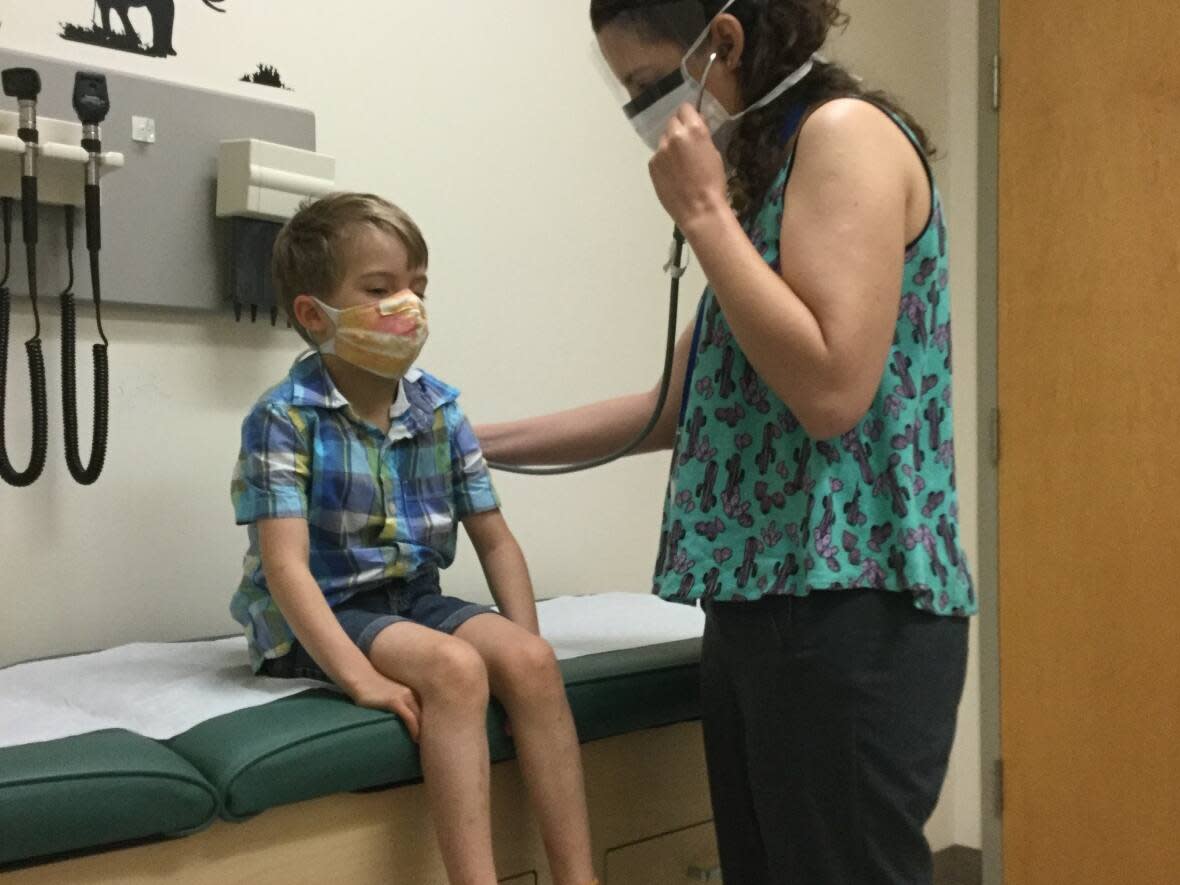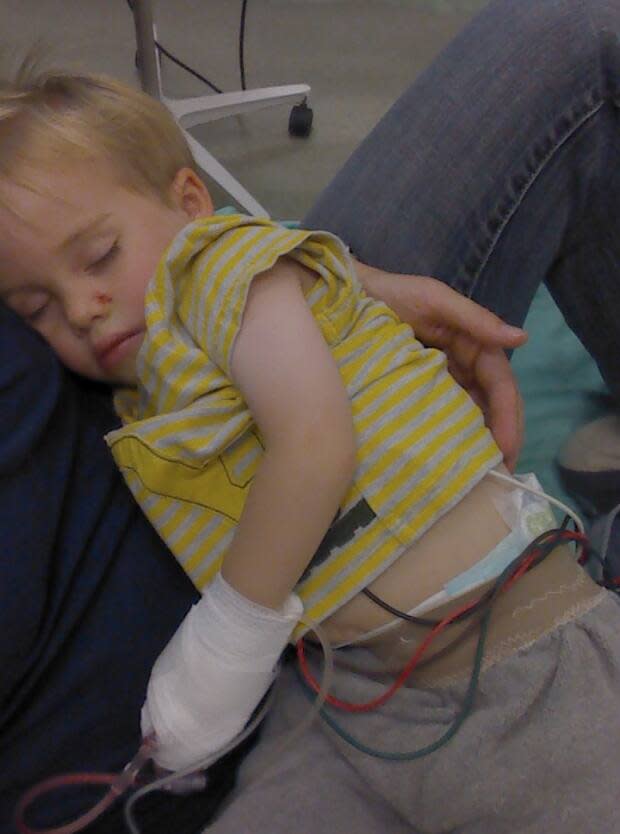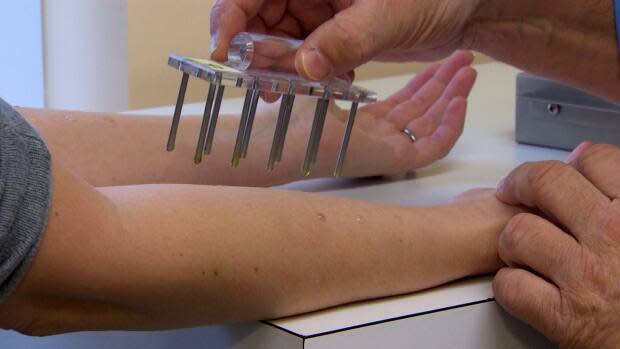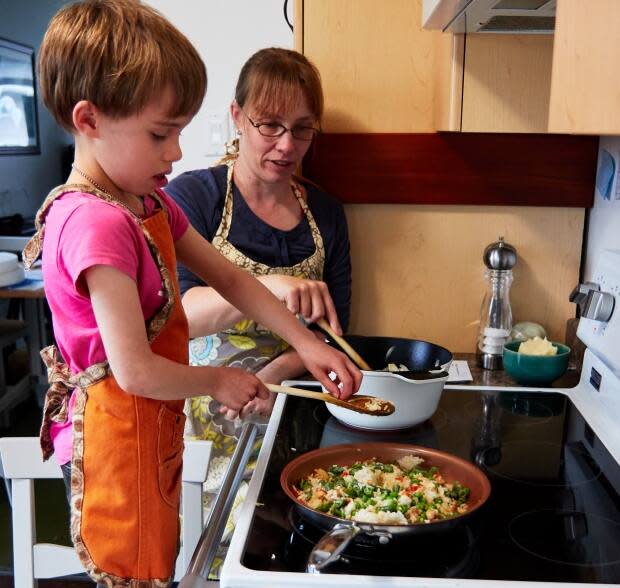Lack of access to allergy specialists outside Vancouver area is a potentially fatal problem, parent fears

When Teakren Cargill was six months old his mom fed him some scrambled egg, a common soft food for babies to try.
It turned into a medical emergency.
Teakren was sick to his stomach, his lips and eyes swelled, his face turned red and he stopped breathing.
Coral Cargill rushed her son to the hospital, where he was treated for anaphylaxis and Cargill was told he would need expert help for a severe allergy to eggs.
Eight years later, Teakren continues to live with severe allergies — not just to eggs, but also milk and nuts.
"If one stray Goldfish [cracker] manages to make its way into his mouth in some format, he's in the hospital for seven hours — if he makes it on time," Cargill told Daybreak North host Carolina de Ryk.
If Cargill wants her son to receive ongoing treatment for his condition — including special tests that must be done in an allergy clinic — they have to travel from their home in Prince Rupert, B.C., to Vancouver, which requires a trip of several days and thousands of dollars in related costs.
Teakren's case highlights the challenges of accessing specialist allergy care for British Columbians outside the province's large urban centres.

An estimated 30 per cent of under-18s in B.C. live with allergies, about seven per cent of which have severe food allergies. There are about 40 allergy specialists available to those individuals — most of whom are in Vancouver.
That means people often have to travel great distances to get treatment. In Cargill's case, she and Teakren take a two-hour plane ride twice a year for a multi-day trip. She's forced to take vacation time from work and has to pay out of pocket for the plane tickets and hotels.

Dr. Amin Kanani, head of the division of allergy and immunology at the University of B.C., is one of the province's few allergy specialists. He said some people living in rural parts of the North actually leave the province for care because it's easier to travel to Edmonton than Vancouver.
A fellowship program at UBC established seven years ago brings in two student allergy specialists a year. But Kanani said most choose to stay in larger urban centres when the fellowship ends.
"We do our best to kind of get our trainees exposed to smaller communities," Kanani said. "If some of them like it, hopefully they may set up practice there."
If the province can't recruit and retain allergy specialists — or any specialists — in more communities outside Vancouver, Cargill said the government should at least be reimbursing parents for their travel.
"I don't know how people who are living on a minimum wage job and paying the rents of today's market can even afford it," Cargill said. "How do they get down there? How did they do it? I don't know."
The province says anyone travelling to see an allergist may be eligible for the Travel Assistance Program — if they meet the criteria, which includes having a referral from a physician or nurse practitioner.
Cargill qualifies, but the program doesn't cover her flights. If she were to take ferries to appointments, it would mean having to take even more time off work.
"It's not a practical option for us," she said.
The Ministry of Health also says employees can legally take up to five days per year of unpaid leave to care for a member of their family.
But in Cargill's case, she needs more than five days to travel to Vancouver, go to appointments, and travel home. And for many, unpaid time off simply isn't an option.
There are some alternatives in place. For example, one of Kanani's former students periodically goes to Haida Gwaii to see patients.
Some appointments can also be done via telehealth apps, while Kanani is working with a nurse practitioner in Burns Lake, around 200 kilometres west of Prince George, who can perform some allergy testing.
But there are still some tests and treatments, such as oral immunotherapy, that must be done in person with a physician, he said.

Until those options are made more widely available, Cargill and her son will continue to travel to Vancouver together until Teakren is old enough to go alone. It's a lot, but she counts herself lucky that she can afford to get her son at least some of the care he needs.
"Some people are going to suffer immensely and their lives are going to be shortened because they can't access services because they literally can't afford it. And that does concern me greatly," Cargill said.


